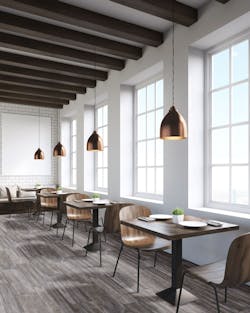Resilient Flooring’s Role in Healthy and Profitable Hospitality
The hospitality industry has been a game of “when will people travel again?” since the arrival of COVID-19. In hotels, “no-touch” safety adjustments and an easing of travel restrictions finally led to an uptick in summer leisure travel in 2021.
But the industry is still waiting for the steady arrival of the more profitable business traveler. Meanwhile, as with other economic sectors, hospitality is experiencing an onerous labor shortage. Lack of sufficient maid service staff leads to “sold out” status among hotels where there isn’t enough staff to keep up and rooms and linens that aren’t cleaned and refreshed on a daily routine.
Yet, when people travel, they expect a clean, safe environment and will pay for it. Major chains like Marriott, Hilton and Intercontinental embraced the new health consciousness in early 2020 to extend the wellness trend in travel that was already underway. BusinessInsider.com acknowledged this scramble for wellness in hospitality, particularly in the new pandemic reality, as a compelling “marketing hook” for good reasons:
- When booking a hotel, the overall number two priority for travelers is enhanced cleaning and hygiene practices, per an American Hotels and Lodging Association (AHLA) report from January
- “Enhanced cleaning” ranked as a top-three factor when making a travel booking for 45% of respondents in an October 2020 survey conducted by vacation-rental platform Home to Go
- 54% of people surveyed in February by the crisis-response company Global Rescue indicated they are concerned about health — particularly as it relates to the coronavirus — when traveling
Wellness and cleanliness are suitable for the hotel business; as HotelBusiness.com observed, “… hotel owners and operators will need to adhere to higher levels of cleanliness—and publicly promote those efforts—to continue to attract guests in this new climate.”
7 Reasons for Popularity of Resilient Flooring in Hospitality
How does this relate to the flooring installed in hotels, restaurants and bars? Because of COVID-19, hotel properties are being reset to accommodate customer needs and expectations related to wellness. Flooring, a part of the FFE (Furniture, Fixtures & Equipment), is a critical component of that strategy.
In a recent interview with Kim Drautz, the president of Tarkett Hospitality observed seven key reasons why resilient, and in particular, LVT and LVP, have become so popular in the hospitality industry:
- Guests perceive them to be a cleaner floor than traditional carpet. Everyone wants to stay in a “clean, fresh product,” Drautz said. That translates into a better brand perception for the hotel chain.
- Quicker to clean than carpet. “If I can shave two to three minutes off cleaning a guest room, that’s a huge plus.”
- Looks cleaner than carpet after a room is serviced to most people.
- LVT/LVP is not going to wear out. According to Drautz, typical hotel room renovations were five to six years. For a variety of reasons, that schedule has increased to eight to nine years on average.
- “Click LVT can be ripped out pretty fast when the room is renovated,” Drautz noted. Speed of renovation is an obvious advantage in the hotel business.
- Pet friendly. For those properties that allow pets, LVT/LVP can withstand the accidents and abuse better.
- Waterproof LVT has become a game-changer for bathroom floors.
According to Drautz, this explains why A&D and hotel property owners specify resilient flooring at an impressive CAGR of 7% to 8%. But when you further examine the benefits of resilient flooring, it’s straightforward to see why it’s the right choice, at the right time, for this environment.
Resilient Flooring Advantages for Hospitality
Resilient flooring has always been a popular choice because of the reasonable initial cost, performance, durability, styling and aesthetics that contribute to branding strategies. With the pandemic focused on cleaning and disinfection, the ease of maintenance has continued to increase the specifications for resilient flooring, promoting confidence in the safety of the hotel environment.
Ease of Maintenance
Ever since ABC News used a black light to expose the true uncleanliness of rooms in 2006, the public has had a healthy suspicion of the hotel environment. Surfaces like LVT/LVP flooring help to allay those fears by instantly giving a cleaner perception of the room.
Resilient flooring provides a hard surface that is easier for cleaning and disinfection. Proper maintenance of workplace flooring surfaces can limit the spread of infection, similar to cleaning and disinfecting other high-touch surfaces (or fomites), such as the notorious TV remote control (reputed to be the highest concentration of bacteria in the room), as well as bathroom surfaces, desks, drawer pulls or doorknobs (which have 918 times more germs than a household toilet seat, according to Forbes).
The EPA List N is the reference document for registered products that are anticipated to be effective against SARS-CoV-2 inactivation. Because resilient flooring is a hard versus soft surface (such as the traditional broadloom carpet in hotel rooms), popular flooring includes luxury vinyl plank or tiles, vinyl sheet, rubber or linoleum can easily be thoroughly cleaned and disinfected.
However, even if a disinfecting chemical is included on the EPA List N for efficacy, it does not mean that the chemical will not damage surfaces. Therefore, all surfaces within a workplace being cleaned and disinfected (including the flooring) need to be reviewed for compliance with the material, surface or product manufacturer recommendations, and the cleaner or disinfectant chemical manufacturer to verify that the chemistries are compatible and will not degrade the material, surface or product.
[Related: The Role of Resilient Flooring in Supporting Wellness in the Workplace]
For chemical disinfectants that are effective as well as the least caustic, use the EPA’s Design for the Environment (DfE)-Certified Disinfectants and follow label instructions. A list of DfE-certified disinfectants on List N is available from the EPA, and found by typing into the search box “Disinfectants for use against the coronavirus SARS-CoV-2 (COVID-19)”.
It is also important to note that advanced wear layers found on most resilient flooring products eliminate the necessity for harsh chemical solutions for regular cleaning. Resilient floors usually only require to be swept and damp mopped with a pH-neutral cleaner. This maintenance advantage reduces the chemicals (and related volatile organic compound emissions) that workers are exposed to and saves time and money for the hotel in the process. Plus, with reduced staffing, as is so common today, reduced cleaning time becomes very important.
Indoor Air Quality
In addition, resilient flooring positively contributes to the hotel’s indoor air quality and wellness to ease of cleaning and disinfecting. Today’s resilient flooring—and even many adhesives used to install some resilient flooring products—is designed to emit very little to no VOCs into the air. VOCs are found in almost every hotel interior finishing and equipment product, including paint, furniture and cabinets.
VOCs are known to cause various adverse health effects, from eye, nose and throat irritation to fatigue and dizziness. In response, the resilient flooring industry supported the creation of a standard and subsequent certification, FloorScore®, that addresses indoor air quality.
The FloorScore® certification is one of the most well-known and frequently searched for and referenced by the design community. So, when specifying resilient flooring, look for the FloorScore® designation, the designer’s assurance that the specified floor has been third-party tested to contribute to good air quality due to significantly reduced VOCs (following California building code Section 01350). Developed by the Resilient Floor Covering Institute (RFCI) and certified by SCS Global Services, FloorScore® certification sets strict limits on the types and amounts of VOCs that non-carpet flooring products can emit.
Healthy Advantages
Much of the traveling public is made up of families with small children. With resilient flooring, hotel owners can be assured that the resilient flooring in their guest rooms is safe for everyone for various reasons. For example, ortho-phthalates have been used as plasticizers to make vinyl products flexible. However, there have been some concerns raised regarding the potential of ortho-phthalates being endocrine disruptors.
As such, in 2010, the resilient flooring industry began replacing ortho-phthalates with terra-phthalate plasticizers that have no known impact on the endocrine system. Terra-phthalates can be made from renewable or bio-resources such as soybeans, palm oils, or castor oils. Today, all RFCI member manufacturers use only terra-phthalate plasticizers in their vinyl flooring.
Another concern that has been addressed is the utilization of heavy metals for stabilizers in flooring formulations. Heavy metals (lead, hexavalent chromium, cadmium and mercury) testing can be completed per test method EPA SW 846 Method 3052 and not exceed the limits of 100 PPM by combined weight. No intentionally added heavy metals are utilized by RFCI members that manufacture vinyl flooring.
For vinyl rigid core resilient flooring products, it is recommended to look for the Assure® certification, which includes third-party testing reflecting no intentionally added ortho-phthalates or heavy metals.
Health & Wellness Building Certifications
In addition to product certifications, the pandemic has created a need to address occupant health within buildings in the context of COVID-19 and community-acquired infections, resulting in the development of Fitwel’s Viral Response Module (VRM) that sets standard for safeguarding occupant health and wellness, including a third-party certification to mitigate viral transmission in buildings.
The WELL Health-Safety Rating certification system has also been developed, focusing on operational policies and procedures, maintenance processes, and the development of emergency preparedness plans to address a post-COVID-19 world.
In this context, it’s clear why resilient flooring is becoming a leading solution for keeping hospitality environments healthy and profitable.
About the author: Jane Rohde, AIA, FIIDA, ASID, ACHA, CHID, LEED AP BD+C, GGA-EB, GGF, is a technical consultant for the Resilient Floor Covering Institute and principal of JSR Associates, Inc.
Read next: Resilient Flooring’s Role in Education and Wellness
About the Author

firstName lastName
i+s partners with design practitioners and other industry experts to deliver informative and engaging content on a variety of topics related to commercial interior design, from the latest trends, research and technology to innovative projects, products and educational CEUs. Interested in becoming a contributor? Contact us today!
